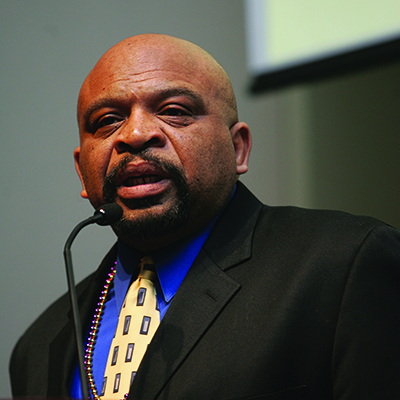The President's Column: Talking About a Revolution
April 19, 2022
by George Gresham
It won’t sound like a whisper.

In the 11 years since Occupy, the gap between the ultra-rich and the rest of us has only grown wider. Time magazine estimates that since the Reagan years, the top one percent of earners have taken a whopping $50 trillion from the bottom 90 percent using a combination of anti-labor laws and a distorted tax system which favors the rich. This has taken place under both Republican and Democratic governments, although the GOP has been far more vicious in attacks on working people and far less willing to challenge the ploys of the wealthy.
The federal minimum wage remains $7.25 per hour, 13 years after it was set. In 1965, the average CEO made 21 times the average worker; today the average CEO—in other countries they are called “oligarchs”— makes 361 times what the average worker earns. In 2019, the three richest men in the country—Jeff Bezos, Bill Gates and Warren Buffet— held more wealth than the bottom 50 percent of Americans put together.
Which brings us to the issue of health disparities, including disparities for low-income healthcare workers.
Low-wage workers and their families, disproportionately people of color, suffer from far higher rates of asthma, hypertension, diabetes, and other COVID-19 co-morbidities; yet they are also far less likely to have health insurance, and far more likely to work in “essential” industries with the highest rates of coronavirus exposure and transmission. Imagine how much safer, healthier, and empowered all American workers might be, if that $50 trillion taken from the bottom percent had been paid out in wages instead of being funneled into corporate profits and the offshore accounts of the super-rich.
Many of the worst abuses take place in the home care and nursing home industries, where profiteering is increasingly rife. Amongst the lowest paid are the caregivers who work in people’s homes taking care of the elderly and people with severe disabilities. There are nearly 2.5 million home care workers in our country. Most have no union and work at minimum wage—again $7.25 per hour—or not much more.
And in for-profit nursing homes, management routinely engages in double-dipping. Instead of paying loyal and experienced union workers what they deserve, many of these institutions set up staffing agencies, which enable them to pay non-unionized staff with tax-payer dollars from Medicaid. The institution can then extract a proportion of the Medicaid dollars destined for wages in the form of profit for their staffing agencies.
Many of the home care agencies and nursing home employers—and the managed care companies that pay them—are for-profit, using people’s need for assistance with the basic tasks of living as a source of gain. This is simply immoral.
1199 home care workers in New York just came together, fought hard with community allies, and won a 20 per cent increase. But we need to continue to fight. Even after our wage increase is phased in, home care workers will only make $36,000 a year if they average a 40-hour work week.
This is a disgrace. These dedicated caregivers are saving lives and providing comfort for our most vulnerable elderly and frail people.
They should be making, at least, a modest $25 hourly. It may seem wishful thinking to believe that caregivers now making minimum wage or barely more could essentially double their hourly earnings, from $12 to $25. But it is intolerable to continue to allow these heroic workers to live in poverty year after year after year.
It's time for us to think about how we launch a massive non-violent campaign to eliminate profiteering in the healthcare system. Just because the system is structured to keep caregivers in poverty doesn’t mean we need to passively accept that structure, especially since homecare is virtually entirely paid for by Medicaid, i.e., public dollars.
Eliminating the managed care companies—middlemen who take money out of the system—would be a good first step.
Please send your thoughts to me at the magazine. Because one thing is clear; the status quo is unacceptable and cannot be allowed to stand.
You can email ideas to: magazine@1199.org or drop them off at union headquarters, marked “Attn: 1199 Magazine, Editor”
1199 Magazine | March / April 2022

